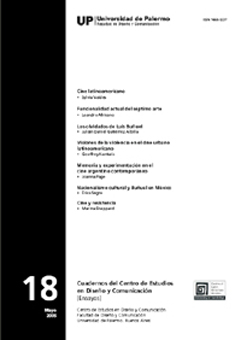Memoria y experimentación en el cine argentino contemporáneo
Resumo
Este artigo analisa dois filmes argentinos que são dos mais inovadores dos últimos anos na estética e
também no potencial para abrir novos espaços de debate cultural e político. Em Los rubios (Albertina
Carri,2003) e Potestad (Luis César DAngiolillo, 2003), a subversiva deliberada de processos convencionais
da cinematografia é fundamental no exame da crises de memória, identidade e representação da Argentina de hoje. O artigo percorre as diferentes teorias cinematográficas e culturais para indagar sobre a
complexa relação que estes filmes traçam entre o cinema e a politica.
Referências
Bernades, H. (2003), Los desaparecidos, una investigación familiar, Página/12: Espectáculos, 24/04/2003, http://www.pagina12web.com.ar/diario/espectaculos/6-19225-2003-4-24.html.
Bordwell, D. (1985), Narration in the Fiction Film, London: Methuen.
. (1996), Contemporary Film Studies and the Vicissitudes of Grand Theory, Post-Theory: Reconstructing Film Studies (ed. D. Bordwell y N. Carroll), Madison: University of Wisconsin Press, pp. 3-36.
Bruzzi, S. (2000), New Documentary: A Critical Introduction, London and New York: Routledge.
Comolli, J.-L. and Narboni, J. (1999), Cinema/Ideology/Criticism, Film Theory and Criticism: Introductory Readings (ed. L. Brandy y M. Cohen), Oxford: Oxford University Press, pp. 752-59.
Freud, S. (1958a), Screen Memories, The Standard Edition of the Complete Psychological Works of
Sigmund Freud (trad. J. Strachey), London: Hogarth Press, vol. 3, pp. 303-22.
. (1958b), Remembering, Repeating and Working-Through, The Standard Edition of the Complete Psychological Works of Sigmund Freud (trad. J. Strachey), London: Hogarth Press, vol. 12, pp. 147-56.
García, E. (2003), Barbie y el Cuchu, dos nuevas estrellas en el cine de animación, Página/12: Espectáculos, 13/08/2004. http://www.pagina12web.com.ar/diario/espectaculos/6-24038-2003-8-13.html.
García, F. (2003), Un nombre marcado a fuego, Clarín: Sociedad, 9/11/2003, http://old.clarin.com/diario/2003/11/09/s-04602.htm.
García, L. (2003), Albertina Carri: La ausencia es un agujero negro, La Nación: Espectáculos, 23/04/
Hirsch, M. (1999), Projected Memory: Holocaust Photographs in Personal and Public Fantasy, Acts of
Memory: Cultural Recall in the Past (ed. M. Bal, J. Crewe y L. Spitzer), Hanover: University Press of New England, pp. 3-23.
Kracauer, S. (1947), From Caligari to Hitler: A Psychological History of the German Film, London: Dobson.
LaCapra, D. (1998), History and Memory After Auschwitz, Ithaca and London: Cornell University Press.
Lerer, D. (2003), La fábula de la reconstrucción, Clarín: Espectáculos, 23/10/2003, http://old.clarin.com/diario/2003/10/23/c-00909.htm.
Moreno, M. (2003), Esa rubia debilidad, Página/ 12: Radar, 23/10/2003, http://www.pagina12web.com.ar/suplementos/radar/vernota.php?id_nota=1001.
Nichols, B. (1991), Representing Reality: Issues and Concepts in Documentary, Bloomington and Indianapolis: Indiana University Press.
Pavlovsky, E. (2001), Prólogo, Potestad, Buenos Aires: Galerna, pp. 13-17.
Prince, S. (1996), Psychoanalytic Film Theory and the Problem of the Missing Spectator, Post-Theory: Reconstructing Film Studies (ed. D. Bordwell y N. Carroll), Madison: University of Wisconsin Press, pp. 71-86.
Sarlo, B. (2002), Tiempo presente: notas sobre el cambio de una cultura, Buenos Aires: Siglo XXI.
Schmucler, H. (2000), Las exigencias de la memoria, Punto de vista, 23: 68, pp. 5-9.
Smith, M. (1995), Engaging Characters: Fiction, Emotion, and the Cinema, Oxford: Clarendon Press.
Stam, R. (2000), Film Theory: An Introduction, Oxford: Blackwell.
Sturken, M. (1997), Tangled Memories: The Vietnam War, the AIDS Epidemic, and the Politics of Remembering, Berkeley: University of California Press.
Terán, O. (2000), Tiempos de memoria, Punto de vista, 23: 68, pp. 10-12.
Tirri, N. (2002), Pavlovsky, del teatro al cine, La Nación: Espectáculos, 18/01/2002, p. 4.
Turim, M. (1989), Flashbacks in Film: Memory and History, New York and London: Routledge.
Vezzetti, H. (2001), Lecciones de la memoria: a los 25 años de la implantación del terrorismo de estado, Punto de vista, 24: 70, pp. 12-18.
Los autores/as que publiquen en esta revista ceden los derechos de autor y de publicación a "Cuadernos del Centro de Estudios de Diseño y Comunicación", Aceptando el registro de su trabajo bajo una licencia de atribución de Creative Commons, que permite a terceros utilizar lo publicado siempre que de el crédito pertinente a los autores y a esta revista.


